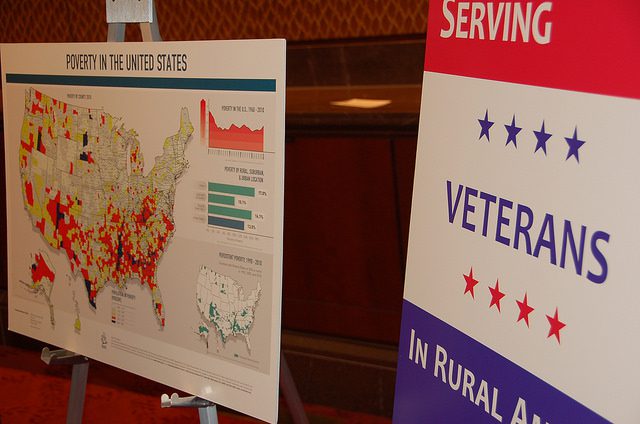
Attended by Sen. Johnny Isakson of Georgia, Sen. Bernie Sanders of Vermont, and Rep. Tammy Duckworth of Illinois, each member of Congress noted the responsibility we share to ensure the well-being of our veterans, regardless of where they may live. It was encouraging to hear elected members of Congress discuss and acknowledge the challenges that exist in providing services to veterans in rural America.
The symposium featured a panel with representatives from the Department of Veterans Affairs (VA) Office of Rural Health, USDA Rural Housing Services, Department of Labor (DoL), and HUD Office of Special Needs Assistance Programs. Each agreed that to best serve our veterans, federal agencies must collaborate. HUD, VA, DoL, and USDA must look for ways to work together within their respective programs that will best meet the comprehensive needs of our veterans. This includes housing, employment, and physical and mental health services.
Fortunately, the elected members of Congress were united on this front as well. Rep. Duckworth discussed the importance of partnerships to ensure veterans in tribal lands received supports. Sen. Isakson noted the potential benefits of providing vouchers to rural veterans so that they may access local health care providers if distances to VA medical facilities are too great. He also noted the unsettling rise of suicides within the veteran population and the need to ensure that mental health services are available and accessible.
Another theme that emerged from the symposium was the obligation to acknowledge the differences that exist between rural America and urban or suburban parts of the country. Rural geographies present obstacles to accessing veteran services including limited public transit, greater distances to needed services, and fewer housing options. A certain level of flexibility in federal programs is required to ensure the needs of rural veterans are met.
Agencies agreed that there is a need to change the way outreach and resources are provided to rural areas, especially for homeless veterans. Better data on rural veterans is critical to achieve this goal, and the uniqueness of rural America must be taken into account during data collection and service provision. The panel noted that issues common to all veterans, like transportation needs, health care needs, unemployment, and housing concerns, are exacerbated in rural areas. Furthermore, the lack of internet in some rural areas can significantly complicate VA or other federal application processes.
The issue of veteran homelessness was also brought up frequently throughout the symposium. Although programs like HUD-VASH, which combine HUD housing vouchers with case-management and clinical services provided by the VA, have been credited in lowering veteran homelessness by 24 percent since 2009, there is still more work to do. This is especially true in regard to female veterans with children, who are more likely to become homeless than their male counterparts. Caring for their children can complicate efforts to seek treatment and housing services, as many supportive housing developments are unable to house families. Rep. Duckworth stated that it breaks her heart to see these individuals, who gave so much to protect our country, having to choose between a home or her family.
As Sen. Sanders noted, the costs of war are greater than we know, and we must continue to meet the needs of our veterans when they return home. Although there is work to be done, it is always encouraging to know that elected leaders, government employees, and local organizations remain committed to this goal. Last week’s symposium was a wonderful reminder of this, and an important reminder to thank our veterans whenever possible.





Comments